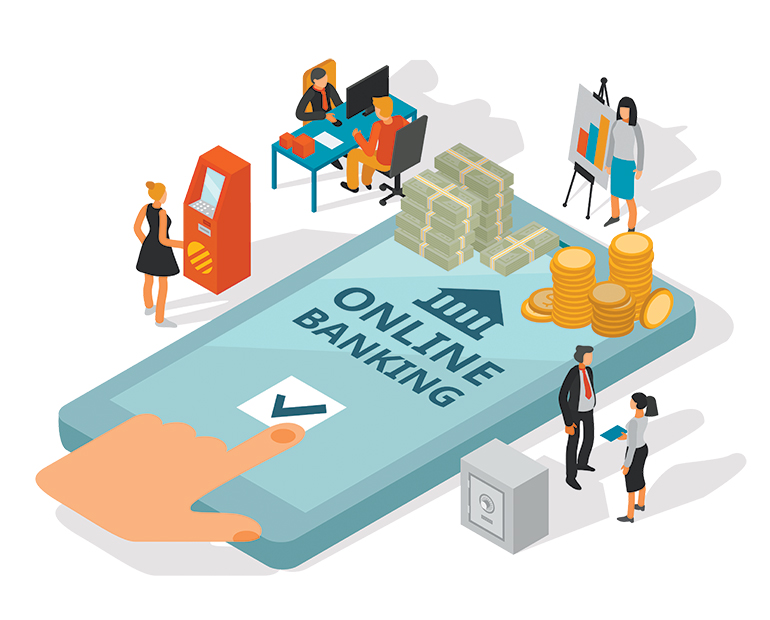In the age of digitalization, traditional banking methods are gradually being replaced by the convenience and efficiency of online banking. With the click of a button or the tap of a screen, individuals can access a wide range of banking services from the comfort of their homes or on the go. As online banking continues to gain popularity, it’s essential to explore the advantages it offers over traditional brick-and-mortar banking. In this article, we’ll delve into the top four advantages of online banking and how they’re revolutionizing the way we manage our finances.
1. Convenience at Your Fingertips
One of the most significant advantages of online banking is the unparalleled convenience it provides. No longer constrained by branch hours or location, customers can access their accounts 24/7 from any internet-enabled device, whether it’s a computer, smartphone, or tablet. This means no more waiting in long lines or rushing to the bank before it closes.
With online banking, you can perform a wide range of transactions without ever leaving your home. Need to check your account balance? Transfer funds between accounts? Pay bills? Simply log in to your online banking portal or mobile app, and you can complete these tasks in minutes. This level of convenience not only saves time but also allows for greater flexibility in managing your finances according to your schedule.
Furthermore, online banking eliminates the need for physical paperwork and manual processes. Account statements, transaction histories, and tax documents are all available digitally, reducing clutter and simplifying record-keeping. Whether you’re at home, at work, or traveling abroad, online banking ensures that your financial information is always within reach.
2. Enhanced Security Measures
Contrary to common misconceptions, online banking is often more secure than traditional banking methods. Banks invest heavily in state-of-the-art security measures to protect their customers’ sensitive information and prevent unauthorized access to accounts.
Most online banking platforms utilize encryption technology to safeguard data transmitted between your device and the bank’s servers. Additionally, multi-factor authentication methods, such as one-time passwords or biometric verification, add an extra layer of security to account logins and transactions.
Furthermore, online banking allows you to monitor your accounts closely for any suspicious activity in real-time. Many banks offer customizable alerts that notify you of large transactions, low balances, or unusual account activity. By staying vigilant and promptly reporting any unauthorized transactions, you can mitigate the risk of fraud and identity theft.
In the event of a lost or stolen debit card, online banking provides quick and convenient options to freeze or deactivate the card to prevent unauthorized use. This proactive approach to security gives customers peace of mind knowing that their finances are protected even in unforeseen circumstances.
3. Cost Savings and Competitive Rates
Online banks often offer lower fees and higher interest rates compared to traditional brick-and-mortar banks. With fewer overhead costs associated with maintaining physical branches, online banks can pass on these savings to their customers in the form of reduced fees and competitive interest rates on savings accounts, CDs, and other financial products.
Many online banks also waive monthly maintenance fees and offer free or unlimited transactions on checking and savings accounts. This can result in significant cost savings over time, especially for customers who frequently use their accounts for everyday transactions.
Additionally, online banking makes it easy to compare rates and terms across different financial institutions, empowering customers to make informed decisions and maximize their earnings. Whether you’re looking for a high-yield savings account, a low-interest loan, or a rewards credit card, the transparency and accessibility of online banking allow you to find the best deals that suit your financial goals.
4. Seamless Integration with Financial Management Tools
Another advantage of online banking is its seamless integration with a variety of financial management tools and apps. Whether you’re tracking your spending, creating a budget, or planning for the future, these tools offer valuable insights into your financial habits and help you make informed decisions.
Many online banking platforms offer built-in budgeting and spending analysis features that categorize your transactions, track your expenses, and provide visualizations of your financial health. These tools allow you to set financial goals, monitor your progress, and make adjustments as needed to stay on track.
Furthermore, online banking APIs (Application Programming Interfaces) enable third-party developers to create innovative financial apps and services that integrate directly with your bank account. From expense tracking apps to investment management platforms, these tools leverage the power of online banking data to provide personalized recommendations and actionable insights tailored to your financial situation.
By harnessing the capabilities of these financial management tools, you can gain a deeper understanding of your finances, identify areas for improvement, and take proactive steps to achieve your long-term financial goals.
Conclusion
In conclusion, online banking offers a multitude of advantages that are transforming the way we manage our finances. From unparalleled convenience and enhanced security measures to cost savings and seamless integration with financial management tools, the benefits of online banking are undeniable.
As technology continues to evolve and customer expectations evolve, online banking will undoubtedly play an increasingly prominent role in shaping the future of banking and finance. By embracing the opportunities afforded by online banking, individuals can take control of their finances, make informed decisions, and achieve greater financial stability and success.






